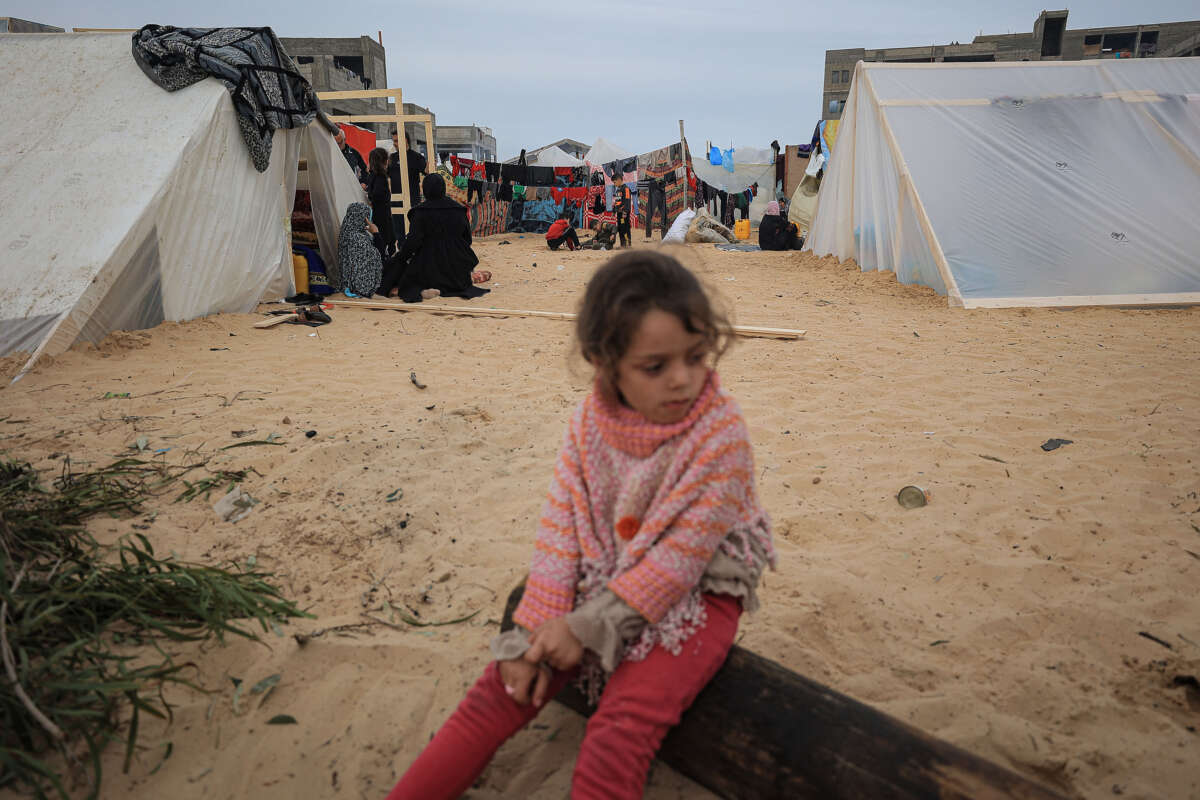Did you know that Truthout is a nonprofit and independently funded by readers like you? If you value what we do, please support our work with a donation.
With much of Gaza’s sanitation system destroyed by Israeli forces, conditions are “ripe” for an epidemic, Oxfam has found in a report released as Israel is forcing hundreds of thousands of Palestinians to flee Rafah into an area that humanitarian workers have described as “uninhabitable.”
In a report published Monday, Oxfam found that Israel has damaged at least $210 million worth of sanitation infrastructure in Gaza, with more damage likely in areas that are inaccessible to workers with Coastal Municipalities Water Utility (CMWU), which manages water and sanitation in the strip, who provided the assessments for the analysis.
“The entire water supply and sewage management systems are nearing total collapse because the damage is so extensive,” said CMWU CEO Monther Shoblaq in a statement. “There is no power to operate the water wells, desalination plants and the remaining wastewater treatment plants and the sewage is overflowing. We are doing all we can, but the situation is desperate.”
Israel’s destruction of sanitation infrastructure has caused foul, hazardous conditions. According to the Municipality of Gaza, there are over 270,000 tons of solid waste, including sanitary waste, piled up in the streets. The waste has attracted flies, which are rampant in the already crowded areas, and other bugs that bite residents that cause symptoms like vomiting and fever for days. Sewage is overflowing into the streets, not only causing an uptick in illnesses but also threatening to pollute crucial groundwater stores and the Mediterranean Sea.
Israel’s blockade of water has already been forcing Palestinians to resort to drinking contaminated or brackish water for months now.
Experts, including UN experts cited by Oxfam, have said that Israel’s use of water as a weapon of war could amount to a war crime. International law prohibits the targeting of civilian infrastructure like water and sanitation services in military action.
Oxfam reported that Israel has destroyed or damaged at least five of its water and sanitation projects since October, facilities that helped to serve over 180,000 people daily. In and around Gaza City, Israeli forces have destroyed 87 percent of water and sanitation facilities, a UNICEF satellite imagery analysis found, while the Gaza Municipality reports that Israel has destroyed 42,000 meters of water supply networks and half of water wells in Gaza.
The sanitation crisis in combination with extreme overcrowding, climate crisis-fueled heat and famine spreading across the region has created a “lethal cocktail,” Oxfam wrote, with conditions “ripe” for outbreaks of diseases like Hepatitis A and cholera. Indeed, environmental field researcher Dr. Rana Dawoud, in Rafah, recently told Mondoweiss that she believes everyone in the displacement centers she’s worked in has a hepatitis infection.
EuroMed Monitor has said that the environmental and health crises are “unparalleled.” Gaza health officials have detected 1 million cases of infectious diseases, while an estimated 90 percent of children under five have been affected — and there are likely more unreported illnesses, as Israel’s destruction of the health system makes it extremely difficult, if not impossible, to assess the spread of disease.
Compounding this is the fact that Israel is currently forcing Palestinians to evacuate Rafah, the last place in Gaza that is somewhat intact, into another extremely small tract of land known as Al-Mawasi, which relief workers have said was essentially “unlivable” even before October.
“These are essentially sand dunes on the Mediterranean coast that are crowded with hundreds of thousands of people who have already been forced to move. So it’s people living in shacks, people living in tents, by the side of a sandy beach road,” said UNRWA Director of Planning Sam Rose in an interview with BBC. “There’s no water networks there, there’s no infrastructure, sewage, sanitation.”
Gaza is already one of the most densely populated places on earth, and now hundreds of thousands are being forced to seek shelter in Al-Mawasi, which is currently housing 450,000 evacuated Palestinians after having a population of about 6,000 prior to Israel’s genocide. The UN Relief and Works Agency for Palestine Refugees (UNRWA) has said that Al-Mawasi is at capacity — and there are likely about a million people left in Rafah who have yet to face evacuation orders.
A terrifying moment. We appeal for your support.
In the last weeks, we have witnessed an authoritarian assault on communities in Minnesota and across the nation.
The need for truthful, grassroots reporting is urgent at this cataclysmic historical moment. Yet, Trump-aligned billionaires and other allies have taken over many legacy media outlets — the culmination of a decades-long campaign to place control of the narrative into the hands of the political right.
We refuse to let Trump’s blatant propaganda machine go unchecked. Untethered to corporate ownership or advertisers, Truthout remains fearless in our reporting and our determination to use journalism as a tool for justice.
But we need your help just to fund our basic expenses. Over 80 percent of Truthout’s funding comes from small individual donations from our community of readers, and over a third of our total budget is supported by recurring monthly donors.
Truthout has launched a fundraiser to add 432 new monthly donors in the next 7 days. Whether you can make a small monthly donation or a larger one-time gift, Truthout only works with your support.
